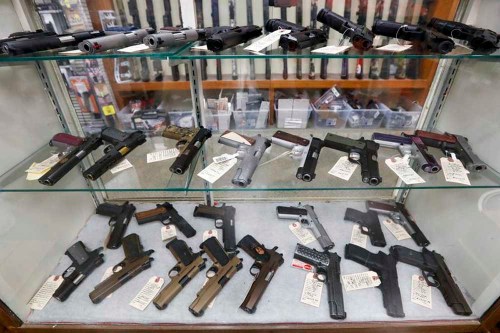Measure 114 causes uncertainty as gun law remains in legal limbo
Published 12:09 pm Friday, December 16, 2022

- Measure 114 would require a permit to purchase a gun in the state and ban the sale or transfer of gun magazines that hold more than 10 rounds.
As Oregon’s Measure 114 remains held up in the courts, the uncertain fate of the voter-approved ballot measure has caused concern and confusion among gun owners and vendors in Central Oregon, but supporters of the law are confident a balance between Second Amendment rights and public safety will be met.
The measure, which passed with 50.7% of votes in the Nov. 8 election, would require gun buyers to acquire a permit and pass a background check before any sale or transfer of a gun can happen. It also prohibits the sale and transfer of magazines with more than a 10-round capacity.
Trending
A judge in Harney County placed a temporary restraining order on Measure 114 on Dec. 6, a ruling the Oregon Supreme Court let stand, temporarily blocking the new law from taking effect as scheduled on Dec. 8.
The stay on the background check and permit-to-purchase provisions in the law were extended by Circuit Court Judge Robert Raschio in Harney County on Tuesday. On Thursday, Raschio also placed a hold on the high-capacity magazine ban provision of the law.
Supporters of the law said the holdup in court is reasonable, and provides more time to get the mechanisms in place for the state to be able to carry out the law. However, gun vendors and gun owners in Central Oregon are confused and concerned as they wait for the courts to come to a resolution.
Wade Ruch of Bend, an army veteran, and a member of the Redmond Rod & Gun Club, enjoys coming to the range with his six-shooter and his semi-automatic target pistol. He recently spent a sunny, windless afternoon at the club keeping his skills honed, hitting metal targets from several yards away.
“I think every reasonable person is concerned about violence, and why wouldn’t they be?” Ruch said. “But I think there are a lot of underlying problems that can’t be addressed by creating laws that unlawful people wouldn’t follow.”
Ruch, who views the Second Amendment as a right, not a privilege, said the focus should be more on mental health than on guns.
Trending
Events such as the shooting at a Bend Safeway over the summer bring into question the reconciliation of Second Amendment rights and public safety. For Ruch, there is a delicate balance between infringing on people’s rights and legislating to keep the community safe.
“People like this that go in and do that stuff (the Safeway shooter), rarely do they just snap and do it,” Ruch said. “Usually, there is a long history of mental illness with it.”
One of Ruch’s main concerns about the law is the permit-to-purchase provision, which would require individuals to provide fingerprints and demonstrate firearm safety proficiency in addition to paying a fee and getting a permit to own a gun. Ruch fears it would be impossible to implement such a provision, resulting in an infringement on gun rights.
He said while he would prefer people to be proficient and responsible gun owners, he doesn’t think mandating it by law is the right way to go. In his mind, every step toward regulation will lead to yet more regulation, Ruch said.
Chris Van Dyke, the former district attorney of Marion County and a proponent of Measure 114, thinks the courts will determine the law is constitutional and it will be implemented. He also believes the holdup in the courts is a necessary step in the process.
“A delay in implementing this until there’s adequate funding, that’s totally reasonable,” Van Dyke said. “That’s what we ought to be focusing on. How do we get the people what they need to make this law work?”
He also acknowledged that the law as it currently stands would place a tremendous burden on the state police and sheriffs’ departments around the state.
“No one has denied that. And I think, now that the voters have spoken, it is going to be up to the Legislature to find the funds to support what law enforcement needs,” Van Dyke said. “And for one, I would love to see our sheriff enforce the law, and tell us what they need to do these things, and stop trying to be constitutional arbiters.”
Several sheriffs in Oregon have declared they will not enforce the law.
Van Dyke, who owns 12 guns himself, pointed out the right to bear arms is a fundamental right but not an absolute right, meaning the right to bear arms is subject to reasonable limitations.
“I don’t think it is too much to ask a hunter or someone looking into a firearm to pause, and make sure they understand the laws around gun ownership, the safe handling of them, be subjected to a background check, to make sure they’re legally entitled, before they get a gun,” Van Dyke said.
Van Dyke said the minor inconvenience the law creates is a necessary sacrifice to tackle the epidemic of gun violence. However, while the law remains in limbo, it has thrown a wrench in Central Oregon’s gun industry.
The Wes Knodel Gun Show, which was scheduled to take place at the Deschutes County Fair & Expo Center on Dec. 10, was canceled after many of the vendors pulled out due to uncertainty surrounding Measure 114.
Kendra Alsterberg, the president of Wes Knodel Gun Shows, said she chose to cancel the show when she learned Measure 114 would go into effect three days prior to the show. She said the issue involved the inability to perform private-party background checks to remain compliant with the new law.
Measure 114’s passage triggered an onslaught of people seeking background checks to purchase a firearm, which has since overwhelmed the state with requests, Alsterberg said.
“When that happened, Oregon State Police were no longer answering the phones to process private-party background checks,” Alsterberg said. “Because of the backlog, private-party transfers could not be completed.”
The inability to perform a private background check effectively made buying guns at the show impossible, so vendors pulled out and the event was canceled.
One such vendor, Zac Detweiler, a federal firearms license holder who sells and transfers firearms out of his home in Redmond, said all he can do at this point is wait and see what the courts decide.
“I have sold out of just about all of my inventory … (and) I am not bringing in anything else even though I am getting requests for stuff daily,” Detweiler said. “There’s too much unknown, and I don’t want to bring in merchandise that I won’t be able to sell, and I don’t want to transfer to people when it is unknown whether they will be able to acquire it in a timely manner.”
John Hummel, Deschutes County district attorney and a supporter of the new law, said citizens who are concerned about the law should know that Measure 114 is not intended to infringe on their right to bear arms.
“I think many people think 114 is really a wolf in sheep’s clothing, and it’s thinly designed to really prevent Oregonians from ever having a gun, and we are trying to take their guns, but that is not the case,” Hummel said. “People should hope that that’s the case, because if that were the case, the court would for sure throw it out.”
Measure 114’s ban on the sale and transfer of high-capacity magazines is likely to be the best way to decrease fatalities during a mass shooting, Hummel said.
“When large-capacity magazines are used in mass shootings, significantly more people are killed. You would expect that, but they actually did the study. And they showed that there are 60% more deaths in mass shootings where high-capacity magazines are used,” Hummel said.









